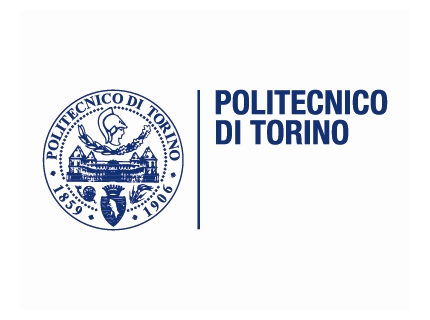Politecnico di Torino (POLITO), founded in 1859, is a leading public university, in Italy and in Europe, in technical-scientific education and research. POLITO has 30.000 students studying on 120 courses (28 Bachelor’s degree courses; 32 Master of Science courses; 23 Doctorates and 37 specialization courses). The staff includes more than 900 professors and researchers, and around 900 members in administration and technical staff. Research activities are organized in 11 Departments and activates about 800 collaborations per year with industries, public institutions and local organizations. With more than 150 bilateral international agreements and 40 double degree agreements, POLITO has links with the most prestigious Universities in Europe. Moreover, POLITO is part of some of the major European interuniversity networks, such as CESAER, CLUSTER, E.C.I.U, EUA, and CMU. As regards FP7, POLITO is involved in 130 projects, of which 22 coordinated, with an EU contribution of around 35 million Euro. Regarding the participation in the H2020 program, POLITO is involved in 127 different actions, of which 22 coordinated, with an EU contribution of 40 million Euro. POLITO is also involved in the FET flagship initiatives such as Graphene and Human Brain Project. POLITO is also involved in extra-European cooperation projects funded by the Siebel Energy Institute, federal authorities such as NIH (National Institute of Health) and NIST (National Institute of Standards and Technology). POLITO is partner of EIT (European Institute of Technology) Inno Energy and Digital KIC (Knowledge Innovation Community).
 In November 2013, the European Commission awarded Politecnico di Torino with the label “HR Excellence in Research”, recognizing the commitment in implementing the principles of the European Charter for Researchers and the Code of Conduct for the Recruitment of Researchers.
In November 2013, the European Commission awarded Politecnico di Torino with the label “HR Excellence in Research”, recognizing the commitment in implementing the principles of the European Charter for Researchers and the Code of Conduct for the Recruitment of Researchers.
The Department of ENERGY (DENERG) is the point of reference at Politecnico di Torino for the areas of knowledge concerned with energy and sustainable development. The Department mission is to improve the existing energy technologies and promote new ones, as well as contributing to the rational and informed use of energy resources. DENERG promotes, coordinates and manages basic and applied research, training, technology transfer and services to the local community and industry in the fields of thermodynamics and thermo-fluid dynamics, fluid machines, energy systems, combustion, physics of nuclear reactors and plasmas, nuclear plants, principles of electrical engineering, electrical machines, electrical drives and power electronics, electrical power systems, thermos-physical and electromagnetic properties of materials, indoor environment engineering, lighting, and acoustics. DENERG is currently involved in more than 20 H2020 projects.
DENERG is member of European Energy Research Alliance (EERA); this network of European public research centres and universities is one of the cornerstones of the European Strategic Energy Technology Plan (SET-Plan). DENERG is also member of the DHC+ and Res4Med Associations.
The Department of APPLIED SCIENCE AND TECHNOLOGY (DISAT) focuses on research and education involving the fundamental principles of matter and energy, their transformation and related engineering applications. The DISAT endorses, coordinates and manages fundamental and applied research, education and technology transfer and its staff counts on more than 120 faculties, 200 research assistants.
The department of Applied Science and Technology at POLITO involves in the project the Electrochemistry Group which more than 80 years of experience on electrochemical storage systems and the Chilab – Materials and Microsystem Lab (www.polito.it/micronanotech), accounting 50 human resources with long-term technological and fundamental competences in the growth, characterization and processing of materials at the micro and nano-scale for the fabrication of MEMS, microsensors, Lab-On-Chip and micro- and nano-structures to target different application fields.
Our main tasks in the SEABAT project
In the SEABAT Project, in the WP2 POLITO will contribute with guidelines for the specification of the battery system, with specific references and links to activities and projects already accomplished or running in Europe (ETIP BatteRIes Europe, European Battery Alliance 2050). In WP3 POLITO will produce a quantitative analysis and comparison of the proposed storage solutions with definition and evaluation of specific figures of merit. For modular solutions the fundamental “electronic storage brick” (to be replied to get the whole system) will be deeply analyzed. In WP4 POLITO will work on the assessment of the specific protection and connection components for interfacing the battery system and the power converter(s) with reference to the specifications defined in WP3. POLITO in WP5 will produce an evaluation of the detailed final solution, with reference to the trade-off parameters defined in WP3. In WP6 POLITO will contribute to the definition of the test requirements for the validation of the system, with specific reference to the evaluation of the figure of merit defined during the design process. Polito will work in cooperation with the partnership on thermal testing and abuse tests on the cells. Last in WP7 POLITO will contribute in submitting papers in Conferences or Journals or Open Access and to the overall D&C plan.

Visit the Website
 “The reduction of GHG emission and pollution is a statement for Europe and its citizens. Working together in SEABAT project is an important opportunity to acquire and spread research results in the field of batteries and power electronics. Our work will contribute to a cleaner sea.” Mariapia Martino
“The reduction of GHG emission and pollution is a statement for Europe and its citizens. Working together in SEABAT project is an important opportunity to acquire and spread research results in the field of batteries and power electronics. Our work will contribute to a cleaner sea.” Mariapia Martino